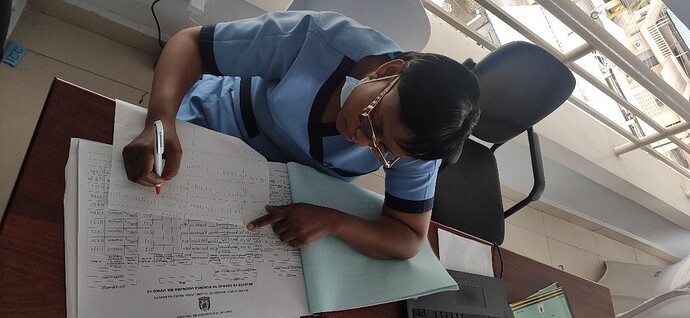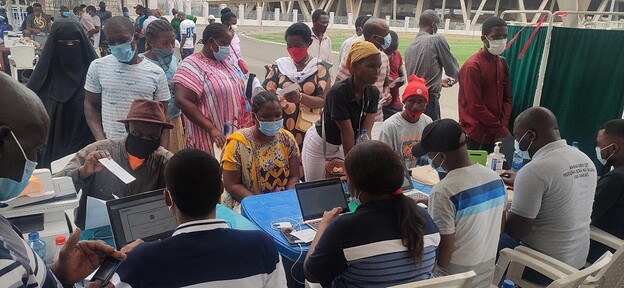Since the first case of the coronavirus disease was announced in Tanzania on March 16, 2020, the government has employed several approaches in its fight against the pandemic. The recent effort has been the kicking off the COVID-19 vaccination campaign targeting 60% of the population in line with global public health standards for tackling COVID-19. In August 2021, the first phase of the mass vaccination campaign was launched with over 500 COVID-19 vaccination centres across the country, ensuring most Tanzanians get vaccinated.
To manage the COVID-19 vaccination data, the Ministry of Health, Community Development, Gender, Elderly and Children (MoHCDGEC), through the Immunization and Vaccination Department (IVD), engaged HISP Tanzania to develop an information system that would help oversee the vaccination bookings, captures and maintain patient-level vaccination information and generates digital COVID-19 vaccination digital certificates. The nature of COVID-19 data and the urgency for optimum solution required the engaged team to come up with alternative innovation instead of using the existing routine vaccination systems. The solution was expected to address the challenges MoHCDGEC was facing with the manual data collection process, whereby vaccination data were recorded manually in registers, health workers generating daily vaccination summaries and vaccinated individuals given paper-based certificates. Such manual processes added extra workload to health workers attending the public, and the potential for generating fake certificates.
Figure 1: Health Worker summarizing daily aggregate COVID-19 vaccination data
The ChanjoCovid, a web-based Application (chanjocovid.moh.go.tz) was thus developed by HISP Tanzania using the District Health Information Software 2 (DHIS 2) platform. DHIS2 is the preferred Health Management Information System (HMIS) by the MoHCDGEC and facilitates the collection, analysis and dissemination of routine health information across the country. The development of the ChanjoCovid application followed an agile participatory approach with the team working collaboratively with the MoHCDGEC and Immunization stakeholders to map out the requirements and design of the system. Sprint development with iterative feedback from the stakeholders allowed the HISP Tanzania to digitalize COVID-19 paper tools ready to support the country’s COVID-19 vaccination campaign. The implementation of the system was proceeded by a pilot in selected health facilities in the Dar es Salaam region, followed by a rapid rollout of the system nationwide. Experience and lessons learned from the pilot sites were integrated into the system, facilitating a robust and user-friendly solution.
Figure 2: ChanjoCovid public portal for self-registration
The ChanjoCovid application facilitates self-registration and booking for COVID-19 vaccination at the preferred vaccination site and date through a public portal. The application sends regular notifications to registered individuals reminding them of their appointments at selected vaccination facilities. Upon full vaccination, a digital COVID-19 certificate is generated, fulfilling international requirements as confirmation for vaccinated clients. The digital COVID-19 certificate contains a QR code with the necessary data to securely verify the certificates’ authenticity, integrity, and validity. The application provides daily summary reports and customized dashboards facilitating reporting by immunization data managers at national and sub-national levels to meet the government’s needs for aggregate reporting.
Figure 3: Vaccination site workers managing COVID-19 vaccination data digitally
The initial phase of the COVID-19 vaccination campaign targeted priority groups that included frontline healthcare workers, individuals with comorbidities aged 18 years and above, adults above 45 years and above, and essential frontline workers from key sectors such as the port of entry and security and defence force and teachers. The government had received the first batch of COVID-19 vaccination with over 1 million doses of the Johnson & Johnson COVID-19 vaccine administered by a single shot. The ChanjoCovid application facilitated individuals to self-register and schedule vaccination appointments, relieving health workers of the burden of manual registration. Health workers searched for an appointment at the vaccination centres and ensured the consent form was signed before vaccination. After vaccination, records were updated accordingly, using either tablets or computers, triggering the generation of a digital COVID-19 certificate. A notification with a link to the digital certificate was immediately sent to the vaccinated person. Daily aggregate reports are generated each day after closing the vaccination site and shared with the immunization data managers at district, regional and national levels.
To ensure the system’s continued use, the HISP Tanzania provide regular support and build capacity to the Ministry of Health team at the national and sub-national levels. The previous knowledge of using DHIS2 among data managers at the national and sub-national levels has facilitated the seamless adoption of ChanjoCovid within Immunization stakeholders. However, further efforts are required to support health workers at the facility level using the digital solution instead of the ‘familiar’ paper-based registers or excel sheets. In addition, the HISP Tanzania is working with other Immunization stakeholders on the interoperability between DHIS2 and logistics systems allowing for real-time stock management and monitoring at the district and national level.


